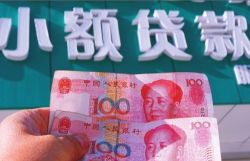Private lending
Private lending (民间借贷) is lending between citizens, citizens and a legal entity, and citizens and corporations. Private individual lending activities should observe national laws and relevant administrative regulations on the principles of voluntary, honesty and mutual aid. The interest rate of private lending should not be four times higher than that of banks in China. Excessive interest is not protected by law.
A related official at the People's Bank of China received an interview on Nov. 10th 2011. At that time, he indicated that private financing is legitimate; and a lending relationship should be protected by law if it does not violate compulsory regulations.
Although private lending meets some of the needs of financing in society, it has generated several criminal acts such as the illegal absorbing of public deposits; fraudulent fund-raising; usury; and money laundering.
As the country tightens credit in its fight against rising inflation, many small and medium-sized enterprises (SMEs) starved of capital are driving an underground banking boom by turning to unofficial funding sources to survive. About 80 percent of the SMEs in Zhejiang Province are using underground banking loans to fund their businesses, even though black market interest rates in the province have surged to as much as 10 percent a month, according to statistics provided by the provincial government.
Private underground lenders are particularly active in the eastern city of Wenzhou, a city that has boomed over the past three decades by producing a wide range of consumer goods.
The accumulation of wealth as a result of manufacturing has also led to ample liquidity in the local market. The black market in Wenzhou is threatening to replace local banks as the major source of funding to finance the town's undiminished construction boom. Staying out of sight, the key market players are numerous underground lenders, operating in a legal gray area to take deposits and make loans at interest rates that can run as high as 200 percent a year.
In July 2011, Wenzhou's underground banks processed 110 billion yuan ($17.2 billion), about 40 percent more than the 80 billion yuan processed in the same month a year earlier and equivalent to more than one-third of the city's entire 2010 GDP of 292.56 billion yuan, according to statistics from the Wenzhou branch of the People's Bank of China (PBOC).
However, the huge risks inherent in underground banking have inevitably damaged the city. Starting at the beginning of April, many SME owners disappeared after failing to pay back money they'd borrowed from underground banks. Huang He, the chairman of Wenzhou Jiangnan Leather Co Ltd, closed down his factory without warning, while still owing billions of yuan to workers and money lenders.
Great concerns have been raised concerning the sensational case of Li Pengfei, chairman of Nei Monggol Xin Yuan Tai Investment Group Co, Ltd, who illegally absorbed public savings and Wu Ying, legal representative of Zhejiang Ben Se Holdings Ltd, who defrauded investors. In a press conference after the fifth session of the 11th National People's Congress in March 2012, Premier Wen Jiabao said that the case of Wu Ying inspired profound discussion on the legal relationship and principles of private lending, and the explicit legal protection of private financing.
Wen demanded suppression of the development of usury during his tour of investigation of private lending in Wenzhou in October 2011, insisting that supervision of private lending should be strengthened to guide the industry to flourish in a healthy way and exert positive influence.
To regulate underground private financing, the government set up a pilot financial reform zone in Wenzhou in March 2012 to encourage the participation of private capital in reforms of local financial institutions. Similar zones were later established in the Pearl River Delta in Guangdong Province and Quanzhou in Fujian Province.
By the end of 2012, Wenzhou had set up four lending registration centers to regulate the private financing market and promote transparency, and registered loans totaled 1.4 billion yuan, of which 420 million yuan had found borrowers.
